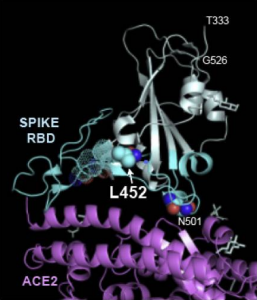A group from University of California, San Francisco has reported effects of B.1.427/B.1.429 SARS-CoV-2 variants onto infectivity and neutralization.
https://pubmed.ncbi.nlm.nih.gov/33991487/
Famous SARS-CoV-2 variants are B.1.1.7(originally detected in UK), B.1.351(South Africa), and P.1(Brazil) variants. The B.1.1.7 variant is characterized by N501Y mutation, and the B.1.351 and P.1 carry E484K, K417N/K417T in addition to N501Y mutations.
B.1.427/B.1.429 variants appeared in California from September, 2020 are characterized by S13I, W152C, L452R mutations in the spike protein coding domain, and L452R is in RBD.
These variants showed 18.6%–24% increased transmissibility relative to wild-type circulating strains, and antibody neutralization assays revealed 4.0- to 6.7-fold decrease in neutralizing titer from convalescent patients and 2.0-fold decreases in neutralizing titers from vaccine recipients, respectively
The reason of this change could be due to structural changes in the RBD which are caused by formation of a hydrophobic patch on the surface of spike RBD by L452 together with F490 and L492.

